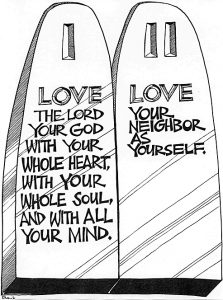Your words are spirit and life
July 10, 2016
FIFTEENTH SUNDAY IN ORDINARY TIME
Deut 30:10-14
These commands, already in your heart
Ps 69:14, 17, 30-31, 33-34, 36, 37
Turn to the Lord in your heart
Or
Ps 19:8-11
Your words are spirit and life
Col 1:15-20
Hymn of the Firstborn
Lk 10:25-37
The Good Samaritan
http://www.usccb.org/bible/readings/ 071016.cfm
 We are on our way to Jerusalem. Along the way, Jesus will interact with three groups: the disciples, the crowds, and the Pharisees. The last group will carry on a debate with him, which illuminates his teaching even while it increases the tension that builds toward the concluding conflict of the Gospel. It is to this opposition group we are introduced this week.
We are on our way to Jerusalem. Along the way, Jesus will interact with three groups: the disciples, the crowds, and the Pharisees. The last group will carry on a debate with him, which illuminates his teaching even while it increases the tension that builds toward the concluding conflict of the Gospel. It is to this opposition group we are introduced this week.
Luke speaks of a particular set of opponents among the Pharisees—the experts in Mosaic law (in Greek, nomikoi). They will be traveling with us on the way. We’ve seen them once before, at Luke 7:29-30. There they are compared unfavorably to the tax collectors and less honorable others who welcomed the baptism of repentance proclaimed by John. The Pharisees and the legal experts did not. Presumably they felt no need, as they attended carefully to keeping the law.
That earlier passage showed Jesus explaining to the messengers from John what his mission was about, borrowing words from passages in Isaiah: “Go and tell John what you have seen and heard: the blind receive sight, the lame walk, lepers are cleansed, the deaf hear; the dead are raised, the poor have good news announced to them” (7:22). This in turn evokes something even earlier—the reading from the scroll of Isaiah at the synagogue in Nazareth, which inaugurated Jesus’ public ministry (Luke 4:18-19). It was to be a ministry of liberation from debt, death, and disease, in the spirit of Jubilee. It characterized his work throughout Galilee, all the way to chapter nine of Luke.
But now we are on our way to Jerusalem. And the lawyer of the Pharisees makes the first move. “Teacher, what must I do to inherit eternal life?” At this point we have this gospel’s first mention of the law, and Jesus himself raises the question: “What is written in the law? How do you read it?”
“How do you read it?” That is the theme of this encounter.
The lawyer answers with the teaching we have come to know as the Great Commandment, combining Deuteronomy 6:4 with Leviticus 19:18. Love God with your whole being, and love your neighbor as yourself.
But who is my neighbor? This is not an idle question, since the application of Leviticus 19:18 was disputed, with some taking a very narrow definition of neighbor, like the Essenes who counted only other Essenes as neighbors, refusing to recognize others less rigorous than they, even if they were Jewish. Others took a broader view, opening the possibility that all Jews, even converts, could be counted as neighbors. Some held that it included even the foreigners who lived among them.
So, says the lawyer, reasonably enough, “Who is my neighbor?” (We are still working with Jesus’ question about the law: How do you read it?)
At that point Jesus tells the story of the Good Samaritan. The priest and the Levite, heroes of the law, pass on by. There is a law about avoiding contamination by contact with unclean corpses (Numbers 19:11, 13, 16; Haggai 2:13), especially for temple personnel needing to enter into the holy precincts. And this body in the ditch looks to be dead.
But now comes the foreigner, the Samaritan who isn’t bound by the law prohibiting questionable contact. He is free to be moved by “compassion,” a key word in the Gospels. We know the story. After all it has made it into our public vocabulary, even our own legal “Good Samaritan” laws.
But notice Jesus’ final remark. He doesn’t focus on who the neighbor might be. He asks how to act as the neighbor. Something quite different.
For reflection: How does Jesus’ final remark change the conversation?
Father Beck is professor emeritus of religious studies at Loras College, Dubuque




